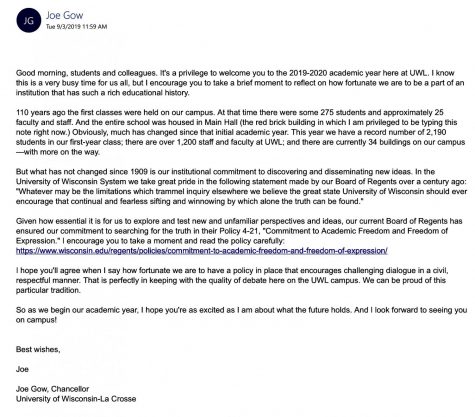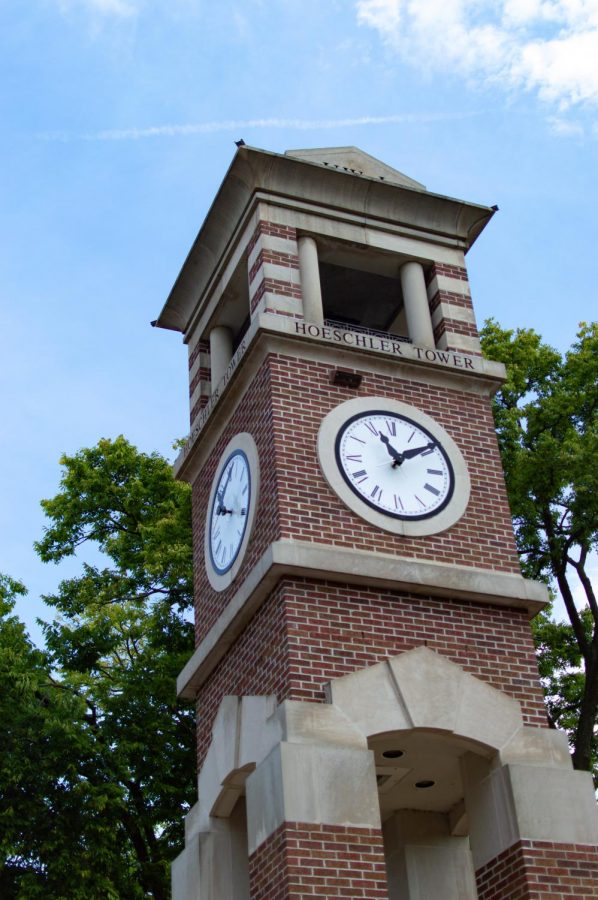Chancellor Gow comments on UWL’s email alert system
October 13, 2019
“Welcome to our 110th Academic Year,” reads the tagline of one of the University of Wisconsin-La Crosse Chancellor Joe Gow’s emails. Sent to students on Sept. 3, 2019, the email served the dual purposes of being a homecoming welcome and an update on the evolution of school statistics, including the number of students, faculty, and buildings since the University’s beginning in 1909, as well as a reminder of an age-old University vision statement:
“But what has not changed since 1909 is our institutional commitment to discovering and disseminating new ideas. In the University of Wisconsin System, we take great pride in the following statement made by our Board of Regents over a century ago: ‘Whatever may be the limitations which trammel inquiry elsewhere we believe the great state University of Wisconsin should ever encourage that continual and fearless sifting and winnowing by which alone the truth can be found.”’
Students in possession of a UWL email address often receive emails from the Dean of Students, UWL News, and Chancellor Gow himself.
According to Gow, in an interview with The Racquet Press, topics for email communications vary. When asked about the qualifications of pertinent information, Gow said, “That’s a judgment call, obviously things that students need to know – regulations – and there are things people need to know, deadlines and such. I was just getting ready to send an email, I don’t know if it will be today, [Oct. 11, 2019] or if it will be until Monday, but an email that will have a link to a newly created a page of information about Title IX and Clery issues at our University.”
True to his word, not two hours later, the student body received new information on UWL Sexual Misconduct procedures and Clery Act information via email at 4:13 p.m. Friday, Oct. 10. The page answers questions about policies and procedures relating to sexual misconduct, and according to Gow, “How the University follows Title IX and responds to complaints, and how we investigate them and make decisions about whether people have violated policy.” The page also allows students to pose questions via an online open forum.

In recent months, UWL has been affected by incidents of sexual misconduct allegations. The UWL student body and officials alike have been participating in a system of legalities, which Gow made clear in his decline to comment on such events in the interview. “In our system, and this is true not just at the university level but also in our legal system, someone is innocent until proven guilty. And so that’s why there’s not a lot of talk about them because we have to respect the facts.”
For this reason, very few comments have been made from school officials regarding both of the confirmed professor’s sexual misconduct cases. However, circulating the school is not the question of what happened, the specifics of cases are justifiably kept confidential for the sake of libel and keeping information credible, but rather what was the response? For those who have been demanding school responses, such as clock-tower protesters, obtaining school-wide accountability has been the prerogative.
With such debates about the accuracy of the Clery Act’s-Annual Statistics Report becoming a common conversation on campus, it is important to note that the email notifications student’s receive, regarding important events on campus, is a separate issue, albeit one that still affects students.
A second professor has recently been put on leave — as confirmed by Nizam Arain, Director of Equity and Affirmative Action and Title IX Coordinator at UWL — but he could not comment on the logistics of the leave. Although, no notifications, via the use of any mediums, were sent out to the student body regarding this decision.
As their administrative leave took hold mid-semester, the curriculum of the class was forced to adapt in their wake. Paige Goethel, a student of the professor said she was taken by complete surprise when she received an email that her class was canceled in their absence. After the initial email, the information that followed had only to do with the actions the school took to remedy the situation, such as the introduction of a new/out-of-retirement professor.
“We found out that class was canceled from another professor and then had to contact them ourselves to find out what was going on. And even then it was very vague. We were kept in the dark for a while,” said Goethel. “It was extremely frustrating knowing that we were already a week behind and then we had to miss a class and get used to a new professor. We didn’t know how we would fit all of the information in the amount of time we had left, and it will still be interesting to see how the rest of the semester will turn out.”
Email, while being a tool that allows for a faster network of communication, can oftentimes be overwhelming. According to a study on Negative Email Effects, done by Bart van den Hooff and colleagues, two things account for the miscommunication through the use of online mail: the over-influx of emails and the ability the sender has to manipulate rhetoric.
“Technologies do not have deterministic effects on organizations, but can be regarded as a contributory or facilitating factor, leading to certain outcomes in a complex interaction with other elements of the socio-technical system of which they are a part (Chae & Poole, 2005; Eason, 2001; Al Ghatani & King, 1999),” said van den Hoof.
In accordance with van den Hooff and colleagues, the manipulation of rhetoric over email has the ability to foster mistrust between the sender and receiver. In the case of students who are at the bitter end of a lack of communication— be it due to a change in the academic situation or lack of immediate correspondence about community events— tension may result.
Gow, after asked about how email communications affect student body discourse said, “It’s hard to say, and I’ve not studied this, but I think email is… I don’t know that students are using that as a primary communication tool. I know people do a lot more now these days with text and Instagram and social media. So it’s hard to say how that works exactly.”
Gow did mention that there is an emergency method of communication in place, that helps in the upkeep of Title IX requirements.“We do have an emergency notification system. That does do text and email and phone calls, but that is an emergency system… The chief of campus police supervises that system.”
The campus police also have the ability to notify students (not in an incriminating way, but simply in an effort to maintain transparency) as soon as events take place. Gow has the ability to do this, as he also has access to student emails.
Gow said that what is sent to students is a judgment call on his part. He did not comment on the process behind this system.







